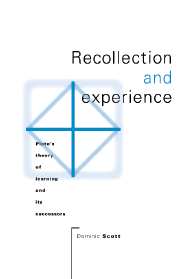Book contents
- Frontmatter
- Contents
- Acknowledgements
- Abbreviations
- GENERAL INTRODUCTION
- SECTION I PLATONIC RECOLLECTION
- Introduction
- 1 The Meno
- 2 Recollection in the middle period
- SECTION II ARISTOTELIAN EXPERIENCE
- SECTION III HELLENISTIC CONCEPTS
- SECTION IV INNATISM IN THE SEVENTEENTH CENTURY
- CONCLUSION
- Bibliography
- Index of ancient passages
- General index
Introduction
Published online by Cambridge University Press: 03 December 2009
- Frontmatter
- Contents
- Acknowledgements
- Abbreviations
- GENERAL INTRODUCTION
- SECTION I PLATONIC RECOLLECTION
- Introduction
- 1 The Meno
- 2 Recollection in the middle period
- SECTION II ARISTOTELIAN EXPERIENCE
- SECTION III HELLENISTIC CONCEPTS
- SECTION IV INNATISM IN THE SEVENTEENTH CENTURY
- CONCLUSION
- Bibliography
- Index of ancient passages
- General index
Summary
Although Plato's theory of recollection is one of his most well-known doctrines, there are only three works in which it appears – the Meno, the Phaedo and the Phaedrus. The earliest of the trio, the Meno, starts like one of the early Socratic dialogues. Socrates claims not to know what virtue is and asks his interlocutor Meno to give him a definition of it. After three separate attempts, Meno's confidence falters and, when asked for a fourth time to define virtue, objects. If neither of them has any idea of what virtue is, how can they make any progress towards a discovery? Socrates introduces recollection to meet this objection. The soul pre-exists the body, and was consciously in possession of knowledge in its earlier state. Upon entering the body the soul forgets its knowledge, but retains it latently in the form of a memory. What makes discovery possible, therefore, is our ability to recollect and revive these memories within us. Socrates then attempts to find some support for his theory in the famous examination of the slave boy.
At the end of the examination he professes himself to be none too certain about the theory, or at least its details, so it is not surprising to find him making another attempt to establish it in the Phaedo (72eff.). Socrates is trying to prove the immortality of the soul, and, as part of an intricate argument for this, wishes to show that the soul must have existed before the body.
- Type
- Chapter
- Information
- Recollection and ExperiencePlato's Theory of Learning and its Successors, pp. 15 - 23Publisher: Cambridge University PressPrint publication year: 1995



